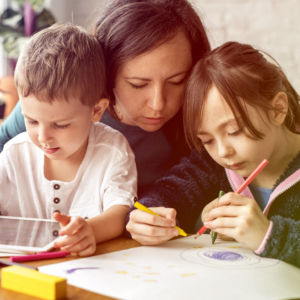With reports of nearly 1 billion students around the world missing school due to the COVID-19 pandemic, education is poised for a dramatic reset.
In the United States, schools have been shuttered indefinitely, with some states indicating that students won’t be required to make up the lost attendance time and the U.S. Department of Education waiving annual standardized testing mandates. Districts are scrambling to offer online learning options, and many parents find themselves in the role of a reluctant homeschooler.
As a homeschooling mother of four, I can say with confidence that this is experience is nothing like typical homeschooling. Libraries and museums are closed, community classes are canceled, friends are distanced, and we’re all stuck inside.
While far from ideal, this sudden, large-scale experiment in homeschooling and virtual learning will prompt more families to question conventional mass schooling and explore education alternatives.
School districts are grappling with how to continue the school year while students are at home, including establishing online learning options.
But some schools are realizing that any curriculum they assign will be deemed optional, for enrichment purposes only, because they can’t ensure that all students have internet connectivity and equal access to the content.
This presents an opportunity for parents and children to disconnect from standardized curriculum and district assignments and discover the abundant resources and learning tools available to them.
Parents will see that they don’t need to know how to teach their kids algebra because Khan Academy, a free, online learning platform, can help their children build math skills. Parents don’t need to know how to teach a foreign language because free tools such as Duolingo can help their children learn almost any language they choose.
There is even more digital programming sprouting now that paid content providers are offering their courses for free during these weeks of social distancing, and organizations such as museums put their collections online.
Parents can help facilitate their child’s learning by connecting them to these ample resources, but they shouldn’t feel the pressure to replicate school at home. Instead of dwelling on how to “keep the learning going” during this difficult time, parents should focus instead on allowing learning to happen.
We are all living through a historic moment, and there is so much that families can learn together while processing and reflecting on this experience. Without the pressure of traditional schooling, parents can focus on encouraging their children to explore their interests in new ways and to create rather conform.
Isaac Newton, who fled London during the 17th century’s bubonic plague, discovered calculus, gravity and a theory of optics during his period of self-isolation. He would call it his “year of wonders.” Unleashing your child’s imagination outside of standard schooling could also lead to new breakthroughs, as passions are nurtured and talents revealed.
Observing firsthand how their children learn and flourish in a different educational environment may lead some parents to think twice about sending their children back to school post-pandemic.
They will find that modern homeschooling is not at all about sitting inside all day, tied to a screen. Instead, it is about authentic immersion in the people, places and things of one’s community.
Homeschoolers in Boston take weekly classes at the Museum of Fine Arts, while in Washington they participate in multi-week programming through the Smithsonian’s National Zoo, and in Ohio they enjoy regular classes at the Cincinnati Museum Center.
Hybrid homeschooling models are also gaining popularity, blending at-home learning with traditional schooling each week.
This is a stressful time for all of us, and particularly for parents and children who find themselves displaced from the familiar routines of work and school.
But the silver lining is that many families will uncover the freedom and flexibility of homeschooling — and what it truly means to be educated without being schooled.

